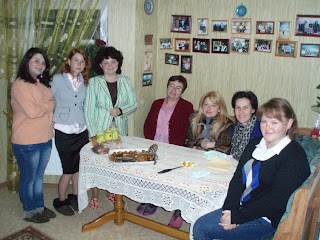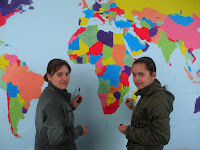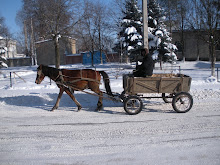 Easter is the most important holiday in Moldova's Eastern Orthodox Culture. About two weeks ago people started "Easter cleaning" in their homes and gardens. Not one tree trunk has gone without white-wash, not one carpet escaped a beating. Furthermore, the most devout have been on a 49 day "post," meaning they have adhered to a strictly vegan diet. Not many made it the whole time, my host brother did, but my host mom just picked out a few of the more important days to participate in the post. Again regarding the big build-up, Maria and I began cooking on Thursday. Basically, she does all things meat related and then sits me at the table to slice home made egg noodles, throw together "salads" of various varieties, and build this cake made of alternating layers of a thin wafer and sweetened-condensed milk with walnuts. In this picture, Maria is preparing one of the two Easter breads.
Easter is the most important holiday in Moldova's Eastern Orthodox Culture. About two weeks ago people started "Easter cleaning" in their homes and gardens. Not one tree trunk has gone without white-wash, not one carpet escaped a beating. Furthermore, the most devout have been on a 49 day "post," meaning they have adhered to a strictly vegan diet. Not many made it the whole time, my host brother did, but my host mom just picked out a few of the more important days to participate in the post. Again regarding the big build-up, Maria and I began cooking on Thursday. Basically, she does all things meat related and then sits me at the table to slice home made egg noodles, throw together "salads" of various varieties, and build this cake made of alternating layers of a thin wafer and sweetened-condensed milk with walnuts. In this picture, Maria is preparing one of the two Easter breads.
Friday, things kicked into a little higher gear and Maria recruited me to offer up some manual labor at the bread factory where she is an accountant. Everyone was pitching in for the Easter preparations, no matter one's exact title. We had been trying to find a way for me to go to the factory during the work day anyway, to observe the conditions of the workers. I am at a loss to provide a metaphor or simile that characterizes the factory correctly. The massive structure is 70 years-old, the high ceilings are supported by fading blue-tiled walls, a breeze inevitable blows the poorly constructed and aging windows, and the natural light from the opaque windows on the ceiling and the few bare light bulbs in various crevices of the factory combine to form a dull, stale illumination.
Working in the assembly line, the chatter was simple and anticipatory of the coming celebrations. I fielded lots of questions about how we celebrate Easter in the United States. My answers to these questions always begin with "it's different for every family." The similarities are evident, celebrating spring, preparation of more food than is remotely necessary, and spending time with family. But the fact that Easter isn't a religious holiday for some families, or that in fact there are families and faiths that don't celebrate Easter at all is a bit more challenging for Moldovans to grasp. Completely understandable considering how long their borders were literally locked.
 Finally, preparations being complete (including these eggs that we dyed using only boiled onion skins!), Easter celebrations actually commenced on Saturday night. Some, particularly groups of men or teenagers, built bon fires in fields with the preferred pyrotechnic being scraps of old tires. As my host brother, neighbor, her boyfriend, and myself left for Church, we could see the fires' glow on just about every hill surrounding the town.
Finally, preparations being complete (including these eggs that we dyed using only boiled onion skins!), Easter celebrations actually commenced on Saturday night. Some, particularly groups of men or teenagers, built bon fires in fields with the preferred pyrotechnic being scraps of old tires. As my host brother, neighbor, her boyfriend, and myself left for Church, we could see the fires' glow on just about every hill surrounding the town.
The four of us arrived at the Church about 11:30 pm, and wiggled our way to the front of the room. A few candles had already been lit and although you can not see the choir, they had already begun to sing...And then the clock struck mid-night.
It's not really worth it for me to compare the experience that followed to anything in the United States. First of all, fire marshals would never allow that many people (holding candles nonetheless), crammed into a room with one exit. So instead, I'll just tell it like it happened--they turned out the lights!
There we stood, in the dark. Not one candle lit, not one light bulb providing, crammed like proverbial sardines. I don't know if it was because I just finished reading a Dan Brown novel with a claustrophobic protagonist, or because I am an uptight American, but my heart rate noticeably quickened. Breathing became shallow. And I suddenly became acutely aware of the absence of green "exit" signs flanking the building.
This part probably lasted only two minutes, thankfully, before the priest started the official ceremony. He then entered the sanctuary from behind the closed doors of the altar caring three candle sticks and told the people (it was only my second time in a Moldovan church, but my first time actually understanding what was being said!) to take in the light of Christ. The front rows of people rushed to light their candles from his larger three, and within moments the light had been shared all the way to the back. My host brother, Sergiu, was the one that informed me how true the priest's words were. Apparently, the flame is a descendant of the eternal flame in Jerusalem. Last week the Moldovan government lit a descending flame, transported it in a plane to Moldova, whereby every region then took a flame, and shared it upon the people all across Moldova. My first reaction: what a beautiful celebration. My second impression: hmmm...not quite separation of church and state. Unfortunately, I like both reactions equally.
After taking our flames outside and walking around the Church three times, we went back inside for four more hours of fellowship. No typo folks, four more hours we stood listening to the choir, repeating some rituals, and listening to readings. This video is a sample of an event that took place several dozen times over the course of the night. [Translation: Hristos a înviat! Christ is risen! Adeverat a înviat! Indeed, he has!]
Around four o'clock members of the congregation took communion and we headed outside to prepare for one last ritual. I have been wanting to note that while I have much respect for these so strictly adhered traditions, there were many events throughout the night that not even my very religious elderly neighbors could explain. I will keep asking.
For my town of about 14,000 people there is only one Orthodox Church. So when we eventually headed toward the exit, I expected there to be a line of people out the door. Earlier I had observed speakers that relayed the events inside the church to the courtyard. However, what I didn't expect, was 1,000 people (Sergiu's estimation) surrounding the church with their picnic baskets and candles that continued to share the flame from Israel. At this point Sergiu leaned in and said, "if you thought it was interesting at mid-night, just wait. Va fi mai interesant. It will get more interesting."
This last film pretty much relays the events. The sloppy ending is my attempt to not let my camera get doused, even in the holiest of waters. With the water, the priest was both blessing us (to be well behaved) and the food in our picnic basket. As per the etiquette, we will continue to eat from this blessed food for three days.
...Which is what we did immediately after arriving home at 6 o'clock Sunday morning!
Vă doresc un Paște fericit pe toți, și săbarotile cum doriți și daca doriți!
I wish you all a very happy Easter however/if you chose to celebrate!
 I've spent the last three days saying farewell to my life in Moldova. Rather than attempting to duplicate my two years of service now, I encourage readers to use the sidebars on the right side of this page to browse through my posts on youth development, my community, and Moldovan culture. This blog is my story as a Peace Corps Volunteer in the Republic of Moldova. It exists to help promote Peace Corps' third goal of mutual understanding. If I've done my part, at least a few readers will have learned about the generosity, warmth, and beauty of the people that I shared about through this blog.
I've spent the last three days saying farewell to my life in Moldova. Rather than attempting to duplicate my two years of service now, I encourage readers to use the sidebars on the right side of this page to browse through my posts on youth development, my community, and Moldovan culture. This blog is my story as a Peace Corps Volunteer in the Republic of Moldova. It exists to help promote Peace Corps' third goal of mutual understanding. If I've done my part, at least a few readers will have learned about the generosity, warmth, and beauty of the people that I shared about through this blog.





































































